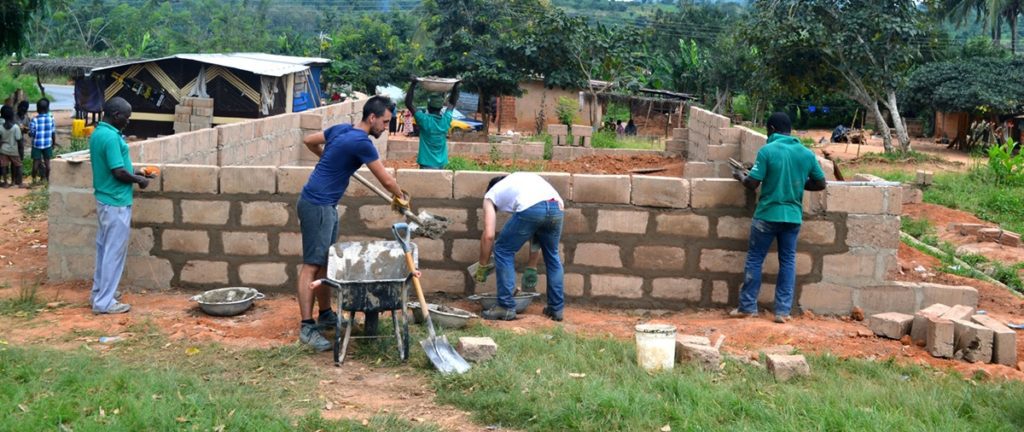Did you notice the flyers last week littering the floor of Manning Clark? Maybe they got you. Maybe you’ve been convinced to abandon your summer plans in pursuit of a better you – a you who builds classrooms so you can teach English to African orphans and white water raft on the side. The best part is, you’ll have a fat resume to boot. If it sounds too good to be true, it’s because it is.
‘Voluntourism’ is not a label the industry accepts with open arms, and for good reasons. Marketing material never uses the phrase itself and, instead, opts for ‘travel for change’ or ‘adventure packed volunteering.’ These phrases are more palatable to their Western audience. The educated young traveller is not a tourist, thank you very much. Tourists do Contiki tours. They, however, ‘live like a local’ for two whole weeks of the year. They’ll have you know that they ate dinner with a local man one night, but no, they can’t remember his name – it was kind of difficult to pronounce.
Voluntourism is so lucrative that an offshoot industry has appeared: orphan trafficking. Children are stolen and trafficked to become nothing more than tourist attractions who live in orphanages far away from their families. If you choose to participate in voluntourism, you are incentivising the institutionalisation and removal of children from their families. NGOs such as UNICEF and Save the Children remind us that trafficked and institutionalised children are at a much higher risk of physical and sexual abuse. We’re sold the narrative that they need our help but, in reality, supporting voluntourism means you’re putting vulnerable children at more risk.
There is also a blatant double standard between our lives at home and what we expect those in host nations to accept. Would you allow unqualified, unvetted strangers to teach your children for two weeks? Would you allow them to build a school? In Australia, you can’t even construct so much as a patio without government approval, let alone a whole public building. Why, then, do we expect Cambodians, Ugandans, or other nationalities to accept shoddy work by twenty-somethings who’ve never used a drill in their life? Too often, the infrastructure projects undertaken by voluntourists are determined by the tours that sell, rather than the needs of the receiving community. It’s an egotistical approach to aid, which ensures that we’re always in power. We drip feed the developing world leaky wells and bumpy roads – which they don’t need – purely so we can feel better about ourselves. Then, of course, we get to return to our comfortable suburban lives while these communities continue to suffer. But, hey, we get a beefed up resume and a guaranteed century on the next Facebook pic, so it was all worth it. Right?
The more immediate problems created by voluntourism are felt more significantly at the local level. Although voluntourists are unqualified, they fill roles as teachers, social workers, builders and nurses, and they pay to do it. It’s easy to see why these exploitative companies would employ volunteers over local staff. By taking important jobs from local sectors, voluntourists are denying these economies the chance to grow and become self-sufficient. Although colonial powers no longer explicitly control governance, they still have a disproportionate influence over the economies, education systems and political structures. It’s the dependency narrative, in which the West dictates the reality of developing host countries, leaving them forever reliant on aid from their former colonial masters.
So, what are you buying when you tack a volunteer program on the end of your holiday? In her piece on backpacker’s privilege in the previous edition of Woroni, Rosie Heselev suggests that these programs exist as resume fillers. Voluntourists use their privilege to buy academic credit, social capital, and to legitimise themselves as altruistic beings. In doing this, they mitigate their colonial guilt by telling themselves that they are making a real difference, but ‘living like a local’ cannot negate the reality of your existence. The very privilege which allows you to take part in voluntourism programs is a direct result of the West’s exploitation of the underdeveloped world since colonial times.
Be honest with yourself. You are under-qualified to do these jobs and choosing to ignore the problems associated with voluntourism is selfish. You are indulging your ego, your future and your resume at the expense of the children whom you are paying to teach. You trivialise and fetishise their impoverished existence, turning their reality into an experience to be purchased. Do they only exist for your selfish purposes? To make you feel better about yourself, your life and your achievements? Please, be honest with yourself. Oh, and by the way, no one likes your tie-dye t-shirt.
If you have skills to donate, you won’t have to pay if they are truly needed. Community organisations, internships and local volunteering are fantastic at finding somewhere you will be useful. If you’re thinking of giving your time or money in the future, Givewell.org reviews and researches charities critically. See their website for charities that make a difference.
We acknowledge the Ngunnawal and Ngambri people, who are the Traditional Custodians of the land on which Woroni, Woroni Radio and Woroni TV are created, edited, published, printed and distributed. We pay our respects to Elders past and present. We acknowledge that the name Woroni was taken from the Wadi Wadi Nation without permission, and we are striving to do better for future reconciliation.
